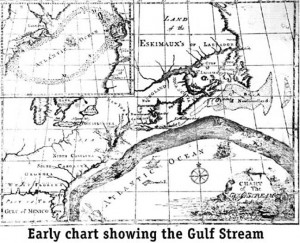 Heading off today for a week in Prague with the World Shakespeare Congress, for which Bernhard Klein and I will run a seminar on “Multitudinous Seas: The Ocean in the Age of Shakespeare” on Tuesday afternoon. Any and all questions regarding the sea-coast of Bohemia seem likely to be solved then, but perhaps Bookfishing will be a bit quiet.
Heading off today for a week in Prague with the World Shakespeare Congress, for which Bernhard Klein and I will run a seminar on “Multitudinous Seas: The Ocean in the Age of Shakespeare” on Tuesday afternoon. Any and all questions regarding the sea-coast of Bohemia seem likely to be solved then, but perhaps Bookfishing will be a bit quiet.
Salty Orientation
While swimming yesterday to Gull Island during the late afternoon flood, I thought about orientation. Much of my recent scholarly work has focused on the challenge of orientation at sea in the early modern period, when the problem of landlessness caused many ships to arrive at places they’d never intended, including the bottom of the sea. The sun and stars helped, except on cloudy days, but mainly for latitude only, at least until the invention of Harrison’s marine chronometer in the 18c.
Being in the water rather than on it changed the kinds of data I could use to find my way across warm, slightly choppy waters to and from the island. I did use the sun’s glare, visible beneath the surface, by steering into it on my way back. But I also timed my swim through the gradual increase in the height of the swell, as I got farther away from the shelter of Kelsey Island, and also a dramatic change in water temperature. Once I finally cleared the wind shadow of the island — the wind was a bit west of south yesterday — the cooler water from out in the Sound blew in, and all of a sudden the temp dropped at least two degrees. It felt good, actually, to swim the last 300 yards or so in cooler, faster-feeling water, even though the swell was up too.
It made me think about things like color and salinity and depth and temperature, all roughly measurable by early modern mariners. Even if they didn’t have good thermometers yet — Robert Fludd may have built one in the 1630s, and Galileo at least knew how in theory, but I’m not sure when they first appeared on boats — one thing I proved to myself yesterday is that human flesh is a decent enough rough temperature gauge. There are all sorts of physical properties of water that can help place humans in the watery element.
Which makes the human body itself a kind of oceanic orientation device, an awkward and inefficient one, perhaps, but really we’re not very good at measuring or locating ourselves on land either.
Books about sailors’ craft, early modern and more recent, talk about “feel” and a mariner’s intuition. Maybe we need to take this sort of seamanlike feel more literally?
The Gulf Stream
 Here’s an image of Ben Franklin’s map of the Gulf Stream, the ocean current Matthew Fontaine Maury famously called “a river in the ocean.”
Here’s an image of Ben Franklin’s map of the Gulf Stream, the ocean current Matthew Fontaine Maury famously called “a river in the ocean.”
It moves roughly 500 times as much water as the Amazon, and when it cools in the North Sea, its sinking brings nutrient-rich colder water up to the surface. (The Gulf Stream’s waters, like most tropical waters, are nutrient-poor and therefore clear.)
I’m reading an interesting book of popular science right now, The Gulf Stream by Stan Ulanski of JMU. Eventually I’ll write an article on the cultural poetics of this ocean current and its massive impact on early modern relations between Europe, Africa, and the Americas. More later.
Blue Empire
Capitol Hill Oceans Week
 Got back last night from moderating a great discussion of recent oceanic books — here’s the video — at CHOW, Capitol Hill Oceans Week. It was an unusual chance for me to rub shoulders professional with oceanic folks very different from my usual crowd of humanists and literary scholars. The rooms were full of scientists, foundation and NGO employees, and a few DC political activists or think tank types.
Got back last night from moderating a great discussion of recent oceanic books — here’s the video — at CHOW, Capitol Hill Oceans Week. It was an unusual chance for me to rub shoulders professional with oceanic folks very different from my usual crowd of humanists and literary scholars. The rooms were full of scientists, foundation and NGO employees, and a few DC political activists or think tank types.
I’ll write a later post on the five books we talked about in my panel — At the Bottom of Shakespeare’s Ocean, Demon Fish, Four Fish, Seasick, and Cold — but for now I want to think about how scientists & humanities types might think together.
The gala dinner featured a bunch of creative speakers — cartoonist Jim Tommey, creator of Sherman’s Lagoon, two prolific IMAX filmakers and surfer from Laguna Beach who have a new One World One Ocean foundation, which by being at the dinner I think I’ve joined, which looks like fun — but the headliners were power brokers. Two Senators spoke, Mark Begavitch from Alaska and John Kerry, each of whom paid tribute to the late Ted Stevens, who received a Lifetime Oceans award largely due to his work on the Fisheries Act, though an old photo revealed him to have been a CA longboarder back in the 50s. He was not really an environmentalist, and was quite hostile to marine sanctuaries — but it was a nice bipartisan event.
The most interesting talks besides the Author’s Coffee I moderated included a rant from a North Carolina-based fisherman who insisted, against the scientists present, that the mid-Atlantic region was drastically underfished at present, a young Aleut from Bristol Bay trying to build support to keep a massive open pit gold mine away from the mouth of the Yukon, and someone from the Island Institute in Maine, where I’ll be in October, who’s been working to save the working harbors of her state, in part by following the model of Community Supported Agriculture. Also some grim news about loss of land to flooding in the Eastern and Western Shores of Maryland that I’d not known about. I also met a great bear-like man from Alpena, Wisconsin, who did 122 volunteer dives in Lake Michigan last summer for the Thunder Bay Sanctuary and its cold, clear, wreck-rich waters.
More thoughts later on humanities and the sciences.
Oceans Week in DC
 This Wednesday, June 8, is, as you all know World Oceans Day. If you’d like to watch me moderate a panel on recent ocean-themed books as part of Capitol Hill Oceans Week, you can watch the event live here. My panel is 8:30 – 10 am on Wed.
This Wednesday, June 8, is, as you all know World Oceans Day. If you’d like to watch me moderate a panel on recent ocean-themed books as part of Capitol Hill Oceans Week, you can watch the event live here. My panel is 8:30 – 10 am on Wed.
To see the books we’ll be talking about, go here.
For a list of other events, go here.
Happy Oceans Day!
Salt on my skin
The best thing about summer in Short Beach — one of the best things — is the feeling of salt on my skin. The water was cold today — NOAA says 60.4 degrees but it feels a touch colder — and my feet numbed up a bit before I got all the way in. For a short stay.
It’s like a hint of an exoskeleton, or gritty fairy dust on my eyelashes. Just an afterthought of ocean clinging to me several hours after my swim. A tangible sense of the changing season. The smell of the world, sticking to me.
“Civilization is a part of the wilderness”
While enjoying balmy & hospitable weather in the East coast — yesterday, while doing a lunchtime lecture on The Tempest at the Harmonie Club in Manhattan, I suggested that we were living the play’s Mediterranean or Bermudan climate, for a few happy post-tornado days — I read this fine post on the idea of “wilderness” in contemporary philosophy. Some really good stuff on the consequences of intellectual flattening, placing humans “amongst beings” rather than hierarchically atop any Great Chain or other vertical structure. Building off Tim Morton’s “dark ecology,” it proposes a “dark enlightenment” —
This doesn’t spell the end of enlightenment, but calls, rather, for a “dark enlightenment”, where we recognize the manner in which we are entangled. Absent this, we are doomed to poorly understand the assemblages within which we find ourselves and to attend to the strange strangers that exceed our expectations. We are doomed to what Deleuze-Bergson referred to as “badly analyzed composites”. Classical enlightenment was premised on an infantile and narcissistic fantasy of the world as a screen for human intentions where we can go so far as to place Jules Verne-like technologies at the core of the earth to manipulate the tectonic plates themselves, thereby enjoying sovereign power over the greatest forces of nature itself. Dark enlightenment recognizes the Lucretian swerve that haunts being such that we exist in an aleatory universe where we are amongst without being sovereigns.
I’m thinking two things about this post, and perhaps about all the OOO-excitement in general.
First, the radical democratic / Latourian moves in which we’re asking for a flatter, more inclusive politics and conceptual space makes a great deal of sense to me, and I wonder how far we can follow it. Surely it carries risks, most especially the risk of incomprehension. That might be fine — no one says the world has to make sense to human brains, and there’s a great deal to be said for what old Tom P. calls “mindless pleasures.” I also wonder about the felt human experience of a wilderness-world, the painful and physical touch “to the skin,” in Shakespeare’s phrase. There’s a fundamental and challenging tension between visions of “multilateralism of agencies” and the subjective physical experience of the human body. Of course our singular bodies aren’t really very singular — lots of viral and bacterial & DNA-replication networks inside the skin bag — but I still wonder how far we can go toward really dispersing the self, or whether our heroic efforts at making the world endlessly plural aren’t themselves struggling against a basic positioned-ness that won’t every really go away, even as we conclude it’s illusory.
I also wonder if the great line I grabbed for the title of this post comes from a reading of Joseph Conrad or just sounds as if it does. I keep wanting to think about these things through literary as well as philosophical lenses — Pynchon and Borges and Dickinson and Shakespeare as well as Whitehead and Delueze and Morton and Latour. That might just be my own laziness & not-knowing Whitehead especially.
Good food for thinking, in any case.
Cloud Wakes
Opening Day, with fire and water
I swam a fast 75 yards fly yesterday to warm up in the cold water, then turned over on my back to float and look back at the shore. It was good to be back in the salt water. Short Beach was in full summer madness, overflowing with people and colors and noises. There was no wind when I’d plunged in, and the salt tang I’ve been missing all winter blended with the smell of a carcass of a 32″ sea bass, caught that morning off the point and already fileted for Memorial Day dinner. The red body caught me eye as I walked down onto the beach to set up the kids on surfboards & inflatable rafts. I’m not sure I’ve ever seen a sea bass that big.
Once out on the water, it was like I’d never left. Salty, silent, isolated from sand and people, with a slow roll once I got past the sheltered cove. The water was cold — 60 degrees 1 meter down, according to a UConn buoy, somebody said — but I wore my shorty wetsuit & felt fine.
How different is it from the pool, where I’ve been spending my early mornings since January? That’s the question I’ll be mulling for the next few weeks.
Swam out to Half-Tide Rock & then timed myself on the way in. 6:18. Probably a bit under 500 yds. Could have gone faster with goggles, b/c I’d have been able to see better.
The real excitement yesterday was on land, at the fire up the street. We watched all four of Branford’s trucks barrel down past the beach, responding to a house that had caught fire due to a cigarette left burning while someone ran to the store. Pretty exciting, & also dangerous in our neighborhood of small yards and close-together houses. Quite a scene, with the fire engines butting up against the surfboards and fishing poles.
Summer is here!
- « Previous Page
- 1
- …
- 6
- 7
- 8
- 9
- 10
- …
- 17
- Next Page »

